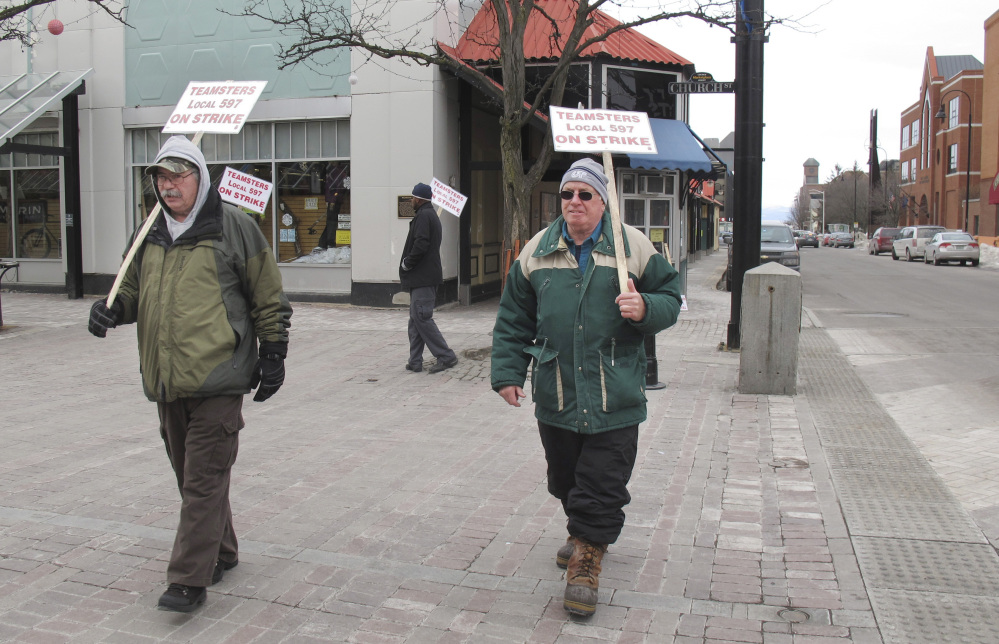BURLINGTON, Vt. — In this lakefront city once nicknamed the People’s Republic of Burlington for its liberal politics and social services, a long bus strike is testing the community’s ability to care for its neediest and youngest.
New immigrants have waited for transportation that never came, food shelves are overwhelmed by demands for delivery and cab companies are backed up by calls from people trying to reach their low-wage jobs.
Perhaps most impactful, the majority of the city’s schoolchildren rely on public buses because the district doesn’t operate its own fleet. During one of the coldest Marches on record, students are walking or getting rides and showing up late in large numbers.
“The community is suffering from this,” said Gracie Rebecca Cade, 19, a receptionist at a South Burlington car dealership who is almost 7 months pregnant and has doled out more than $150 for taxis to get to work. “I am just worried about being able to get to my appointments and getting to work.”
Burlington, on a hill along Lake Champlain with about 42,000 residents, holds the distinction of being the smallest U.S. city to be a state’s largest. It anchors a metro area with a population of about 165,000, mostly within Chittenden County. About 9,500 people a day use the bus system.
The strike that began March 17 is the first in the 40-year history of the Chittenden County Transportation Authority. The bus agency’s management and its unionized drivers are haggling over wages, disciplinary action from anonymous tips, part-time drivers and split shifts.
In liberal and easygoing Burlington, where residents sometimes eschew car ownership not just for economic reasons but also to be green, buses are the only public transit. And while people are turning to carpools, car shares and friends, the length of the strike is exposing chinks in the state’s vaunted armor of social security.
U.S. Sen. Bernie Sanders, the independent sometimes described as a socialist whose 1981 election as mayor helped give Burlington a reputation as a city of unparalleled leftism, said he has been in touch with the union and agency management.
The two sides didn’t seem to be that far apart, he said, but a continuing mistrust of bus agency management by the drivers was dividing them.
“There’s no question this is very disruptive,” Sanders said. “A whole lot of people are hurt, and I hope very much that the strike will be settled as soon as possible.”
The school district helps subsidize the county bus agency because it’s cheaper than running its own fleet. Almost 60 percent of the district’s 3,970 students ride the bus daily, said Superintendent Jeanne Collins. That’s about a quarter of the system’s ridership.
On the strike’s first day, absences increased slightly. Now, attendance is around normal, but tardiness is common, Collins said. Those having a harder time tend to be recent immigrants or from poorer families, she said.
At Burlington High School, the patience wears thinner in the line of parents’ cars extending out of the parking lot and up to the main road.
Senior Henry Prine and fellow students Abby Massell and Sabine Rogers have put up a large map in the cafeteria on which students can mark their home and write down ride requests or offer open seats.
“If one more car has a few more kids in it or two cars have a few more kids in it, then it’s been a success,” Rogers said.
The district might decide to run shuttles next week if the impasse continues, said a spokesman for Mayor Miro Weinberger, a Democrat.
The Chittenden Emergency Food Shelf served about 250 to 300 people a day before the strike, distribution coordinator Edi Abeneto said. Now, it’s a busy day if 60 show up. Calls for delivery have increased, but the shelf can’t meet every demand; Abeneto worries people might be running out of food.
Paula Mongeon, 52, can’t drive because of disabilities and relies on buses. She has a job but leans heavily on food pantries. She has gotten a few deliveries, but keeping her kitchen stocked has been difficult.
“Not everyone has the large circle of contacts that they can rely on,” Mongeon said. “Others are walking the long haul, but this chick can’t do it.”
Ashraf Alamatouri, coordinator for English language learning at the Vermont Refugee Resettlement Program, said that when the strike began, newcomers didn’t know about it.
“They went to take the bus as usual, and they waited for some time,” Alamatouri said. “And there was no bus.”
Weinberger’s office says it informed the public, including new immigrants, with press releases, automated calls and social media.
But Thato Ratsebe, of the social service agency AALV, said in an email that some immigrants couldn’t understand the messages. And the resettlement program said the office hadn’t received anything for non-English speakers about the strike.
Shannon Haley, a 23-year-old store manager, takes buses because she needs to spend her money on student loans, not a car payment, and wants to help the environment. She has resorted to cabs — not a routine or easy proposition in Burlington.
“This pricing is getting ridiculous. I have rent, I have a dog,” said Haley, who has spent more than $200 on cabs since the strike began. She calls at 6 a.m. and said she waits hours.
Phones ring constantly at Everywhere Taxi of Vermont, owner Louis La Rose said.
“I’m making money, but I feel bad for the people,” La Rose said. “I wish they would settle this thing.”
Send questions/comments to the editors.




Comments are no longer available on this story